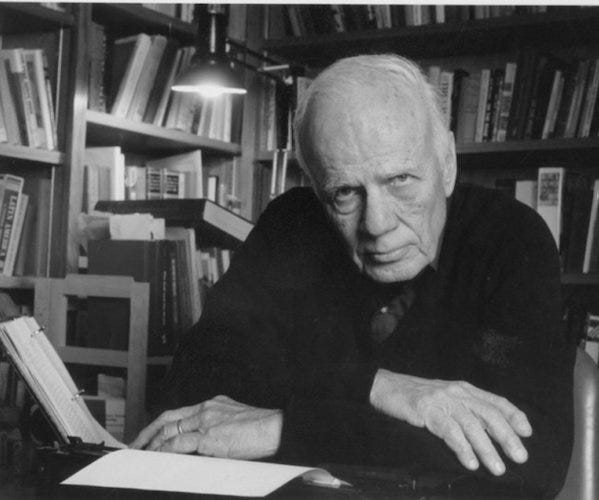Walker Percy’s Diagnosis
Why We Feel Like Ghosts in Our Own Lives
Walker Percy’s “Diagnosis: Why We Feel Like Ghosts in Our Own Lives” offers a profound exploration of the existential malaise that often characterizes modern existence, marked by pervasive feelings of alienation and dislocation. Percy, a distinguished American author renowned for his insightful examinations of the human condition, draws from his personal struggles with clinical depression and a challenging family history of mental illness to address the complexities of identity and self-perception in contemporary society.
His work deeply engages with existentialist themes, positing that individuals frequently find themselves trapped in a ghostly state, disconnected from their authentic selves due to the relentless pressures of consumerism and societal expectations. Percy’s thesis is notably introspective, centering on the concept of “Indirect Soulcraft.” He argues that true self-understanding requires more than mere rational discourse; it necessitates deep emotional engagement and introspection.
To facilitate this, Percy employs diagnostic tools, including a six-question quiz, designed to encourage readers to reflect on their inner experiences and the discrepancies between societal perceptions and their personal identity. By illuminating these disparities, Percy aims to guide individuals toward a more profound sense of self, challenging the superficial measures of mental well-being prevalent in modern psychology.
A significant aspect of Percy’s work is his critique of consumerist culture, which he believes often reduces identity to material possessions and transient experiences. He contends that this societal inclination leads to a pervasive emptiness, as individuals become increasingly detached from their true selves in pursuit of external validation. Furthermore, he warns against simplistic solutions to psychological issues, advocating instead for a deeper, more nuanced understanding of personal authenticity and connection in an age defined by distraction and alienation.
The mass of men lead lives of quiet desperation.
Henry David Thoreau
Ultimately, “Diagnosis: Why We Feel Like Ghosts in Our Own Lives” stands as both a literary and philosophical commentary on the struggles of modern individuals. Percy’s unique blend of existential inquiry with Southern Gothic elements invites readers to grapple with the haunting specters of their own identities, urging a reclamation of authenticity in a world that often feels disenchanted and ghostly.
Background
Walker Percy, a prominent American author and essayist, grappled with clinical depression throughout his life, a battle that profoundly influenced his literary works. His writings frequently explore themes of existential angst, alienation, and the search for meaning in a modern, dislocated society. Percy’s family history played a significant role in his mental health challenges, as both of his parents committed suicide, leaving him orphaned by the age of 16. This tragic legacy of mental illness and suicide traced back several generations in his family, forcing Percy to confront his inherited struggles head-on.
Adopted by his uncle Will, an esteemed Southern Gothic poet and novelist, Percy grew up in an environment rich with literary influence. His childhood was marked by interactions with creative luminaries such as Langston Hughes and William Faulkner, yet he often felt like a misfit among these giants. This sense of disconnection may have fueled his quest for grounding and authenticity, themes that permeate his narratives and underscore the alienation felt by modern individuals.
In his exploration of light and darkness within his works, Percy often uses imagery to reflect his characters’ psychological states. The interplay of these elements serves as a metaphor for the racial and societal issues of his time, highlighting the complexities of identity and truth. This nuanced approach is evident in his characters’ journeys, particularly in their struggles against the backdrop of societal norms and expectations, which often leads to a quest for self-discovery and understanding.
Percy’s existentialist perspective posits that there exists a more authentic self, which can be realized through practices, activities, and communal traditions, contrasting sharply with the alienation of contemporary existence. His philosophical inquiries, influenced by the likes of Albert Camus, are intricately woven into his narratives, prompting readers to reflect on their own experiences of dislocation and the search for meaning in an increasingly fragmented world.
Main Arguments
Walker Percy’s exploration of alienation and self-identity reflects his deep engagement with existentialist themes, particularly concerning the human condition and our relationship with the world. He posits that individuals often exist in a state of dislocation, marked by a profound sense of restlessness and an inability to fully grasp their own identities amidst the distractions of modern life. This existential malaise arises from a combination of factors, including the overwhelming influence of consumerism and the pervasive societal tendency to conflate identity with material possessions and superficial experiences.
Percy’s argument is rooted in the belief that human beings possess an innate capacity for introspection that is often hindered by external pressures. He contrasts the objective understanding of the world, as experienced by animals, with the subjective worlds created by human language and thought. This difference leads to a form of alienation, as people find it challenging to articulate their inner experiences and emotions, which results in a disconnect between their true selves and the identities they present to the world.
Central to Percy’s thesis is the idea of “Indirect Soulcraft,” where he suggests that addressing the complexities of human consciousness requires more than rational discourse; it demands emotional engagement and personal reflection. He introduces diagnostic tools, such as a six-question quiz, to prompt individuals to reflect on their experiences and the discrepancies between their perceptions and societal expectations. This method illustrates Percy’s recognition that personal meaning and identity are often obscured by the language and frameworks imposed by society.
To be yourself in a world that is constantly trying to make you something else is the greatest accomplishment.
Ralph Waldo Emerson
Furthermore, Percy critiques modern society’s tendency to embrace simplistic solutions to complex psychological issues. He argues that contemporary psychological practices often alienate individuals from their authentic selves, promoting a




